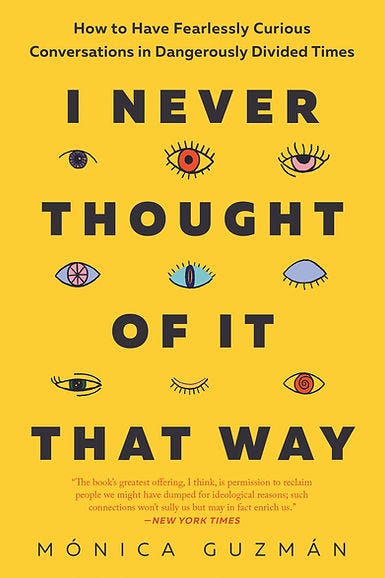"I Never Thought Of It That Way": Let's Have A Great Conversation About Difficult Conversations"Whoever is under-represented in your life will be over-represented in your imagination."Hello! This is Everything Is Amazing, a newsletter about science and applied curiosity. I was initially reluctant to use the word “amazing” in the title of my newsletter - I’m British, and as shows like Downton Abbey and The Crown clearly demonstrate, we don’t go in for those kinds of wretched, unseemly displays of emotion. (A friend even suggested the title could be Everything Is Awesome! We haven’t spoken since.) But here’s a warning for any sensitive British readers: today, I’m about to use the word “amazing” a number of times in a row. Not in that modern overused sense that gets applied to everything willy-nilly (“wow, this objectively underwhelming chicken tikka wrap is amazing!!!!!!”) but in the dictionary-correct sense, where something is worthy of a bit of genuine celebration. Firstly, two amazing pieces of news from the cutting edge of science. In a world first, French and Canadian researchers have found that defective mitochondria can directly drive memory loss in dementia - and by employing a new tool to boost mitochondrial activity in mice, they’ve reversed memory loss in them, paving the way for slowing or even preventing diseases like Alzheimer’s. (Memory restoration has mostly been confined to sci-fi until now - for example, it’s a key plot point in the back end of Kim Stanley Robinson’s Mars trilogy, as I wrote about here - but it looks like it’s now getting a lot closer, maybe even right on time to help combat the plague of false memories unleashed by hyper-partisan fake news on social media.) In other news: it seems science has perfected bee cuisine! We know that bees are incredibly important to our ecosystems and ultimately to our own health due to their role as pollinators - which has made their declining numbers (in some parts of the world) a very worrying trend. Bees need all the help they can get - and along with banning bee-ravaging pesticides, we’ve also now learned how to feed bees better:
Amazing! (I found both of these stories on Bluesky via - appropriately enough - science fiction writers: Hugo Award winner Ada Palmer, former president of the Science Fiction and Fantasy Writers of America John Scalzi, and Hugo & Locus Award winner Kameron Hurley.) Secondly, I regret to inform you that despite what your eyes are yelling at you, these lines are parallel: It's a riff - by artist Victoria Skye- on the classic Café Wall Illusion, first described in 1894 by the splendidly-named Hugo Münsterberg - he called it the "kindergarten illusion", but it was renamed in 1973 based on a café in Bristol. (Hat-tip to Nichol.s.67 on Threads.) Amazing visual trick! But no illusion will ever blow my mind like this one:  If you missed it, the full backstory to the Ames Window illusion is here: Finally, and returning to bees, here is a very important insect conservation PSA: (Thanks to gardener Lou J Nicholls for this one, and to Melissa Harrison for resharing it.) Okay! Today, we’re returning to the alarmingly timely ongoing theme of finding new ways to disagree better: Certainly not with random strangers yelling at you on the internet… …but with people you already know, people you could otherwise sit down and have a very pleasant and open chat with about just about anything, before *waves hand vaguely* all this happened (extremist politics, conspiracy theories, the strip-mining of science funding in the US, you name it). All the stuff that has recently been ripping families, friendships and communities apart at a truly breath-taking pace. For the last few months I’ve been reading and making notes from Mónica Guzmán’s I Never Thought Of It That Way (2022). Here’s how I introduced her work to you back in 2022 - which lands a bit differently in the wake of the 2024 United States presidential election and everything happening there & elsewhere right now: “In her terrific TEDx talk from earlier this year, journalist Mónica Guzmán outlines how empathic curiosity can be used to create understanding across seemingly unbridgeable divides.  In politics right now on both sides of the Atlantic (and elsewhere!), it seems to me that most talk of treating the opposing side with curiosity is quick to devolve into “yeah, but LOOK AT WHAT THEY VOTED FOR!!!” - followed by a finger pointed at one of the noisiest and most objectionable members of said group, with the assumption that their extremism typifies everyone who voted the same way. Sometimes this is warranted. Awful people are undeniably awful and, in the right circumstances, well worth calling out in the interests of factchecking, debate and questioning whatever damn-fool thing they just said. But much more of the time, this can’t be true. It just can’t. No political party in history - apart from maybe a very, very small one - has featured members who are all perfectly united in their beliefs and motivations. This is the whole point of a democracy! Everyone needs a say because everyone’s say is a little different. How does the internet facilitate this? In places, profoundly not well. Our abbreviated tools of communication aren’t up to the job. Many of them run (intentionally or not) on superficiality, negativity and conflict. No wonder we’re all yelling. It’s easy to say all this in the abstract. But Guzmán went and put it to the test. In researching her book “I Never Thought Of It That Way,” she put herself in the middle of those hard, necessary, boots-on-the-ground conversations, and engineered opportunities for US voters on both sides of the partisan divide to meet and share their concerns. She gets talking to a Democrat voter called Laura:
As Guzmán says later in her talk, what everyone wants in a functioning society is to be heard and to be understood. And it’s more fundamental that that - it’s a basic human need. See me for who I am. Talking about kindness, we usually think of tangible gifts, the kind we get at Christmas or on our birthdays. Or we just boil it back to money. But taking the time to listen and understand are a great kindness too - sometimes a priceless one. They give another person the dignity of being heard, to have a voice that says exactly what they’re saying, instead of what we assume they’re saying. All of this is fantastically hard to put into practice. Election cycles remain dominated by news media soundbites, social media yelling-matches and everything else that hasn’t worked so well in actually creating conversation. Oh and hey, an extremely opinionated billionaire recently took over Twitter. The yelling will continue. But as Guzmán says: “whoever is under-represented in your life will be over-represented in your imagination.” The ability to step back from an assumption about others, turn it into a question, and get curious about what you don’t know about why a stranger is voting the way they are when it’s so obviously the wrong thing to do on every level and what are they thinking and they must be monsters - that pause is worth exploring, for all our sake. To lessen our grip on our opinions, and consider what we don’t yet know we don’t know - and to give a stranger the kindness of the benefit of a doubt, until you find a way they can tell you directly what’s up.” OK, back to today. It’s a really fascinating book, brimming with ideas on how to steer stormy conversations into calmer waters, so you have the chance to really truly hear each other out. It’s also an intimately-focused one, which doesn’t pretend to have any big answers about the hugely pressing social and political questions of our time, but instead is concerned with those in-person conversations that hit us so much harder. (If it has one universal takeaway, it’s “the best answers come from talking with people, not about them”.) I’m going to be writing upcoming newsletters about what I’ve learned from reading this book and scurrying down its many fascinating rabbit-holes. But then I realised that’s probably the least interesting and fruitful approach to take here. What would be better would be some kind of open conversation with you around this book. How could that happen? Thankfully, I already have a format for doing that. Last year, I ran the first edition of what I was calling the Big Amazing Read, focused on Alexandra Horowitz’s book On Looking: Eleven Walks With Expert Eyes. It was great fun to dive into this book (one of the inspirations for Everything Is Amazing) with around a hundred of you reading along! At the same time, my execution of it, ummm, let’s just say it could have gone a lot better - I overcomplicated things in my usual blunderingly enthusiastic way, including by using another platform (Threadable) for part of the read, and it ended up being a bit confusing for some folk - those folk including me. This time, I’m keeping it super-simple:
If you want to take part in everything this Big Amazing Read will have to offer, I’d love to invite you in as a paid subscriber of this newsletter: (Thank you!) But either way, I hope you’ll give I Never Thought Of It That Way a read. I think it’s a really terrific guide to getting everyone back around the table to have all the conversations that are so desperately needed right now. Cheers! Mike |





